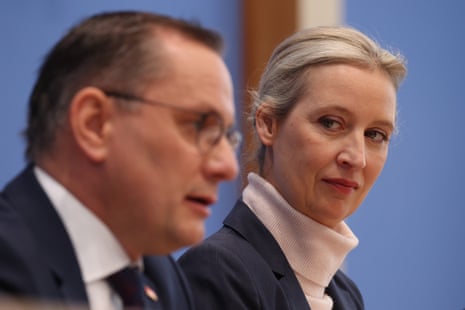AfD plans to challenge extremist classification, calls it ‘defamatory’
The co-leaders of the Alternative for Germany (AfD) said they would take legal action against the domestic intelligence agency’s classification of the party as extremist, describing the decision as a “severe blow to German democracy”.

“The AfD is being publicly discredited and criminalised shortly before change of government,” Alice Weidel and Tino Chrupalla said in a statement, translated by Reuters.
The party “will continue to defend itself legally against these defamatory statements that endanger democracy,” the statement added.
Key events
Closing summary

Jakub Krupa
… and on that note, it’s a wrap from me, Jakub Krupa, for today.
-
Germany’s Federal Office for the Protection of the Constitution, the country’s domestic intelligence agency, has just issued an update on its investigation into the far-right Alternative für Deutschland, classifying it as “confirmed right-wing extremist organisation” (10:27).
-
The agency said that its view, based on a review spanning three years, is that the party’s “ethnic-based” policy seeks to “devalue entire population groups” by treating them as second-class citizens (10:41, 13:10).
-
The party rejected the classification as defamatory and said it would legally challenge the agency’s findings (12:43).
-
The assessment is “likely to reignite the debate about banning the AfD,” although that is not an automatic process and involves a complex mix of political and judicial elements (10:49), with senior politicians urging caution in jumping to conclusions (12:03, 13:32).
Elsewhere,
-
TikTok has been fined €530m for violations of the EU’s General Data Protection Regulation after the Irish Data Protection Commission’s inquiry into its data transfers to China (12:17).
-
Greek authorities have arrested a man in the strategic port city of Alexandroupolis on suspicion of photographing supply convoys on behalf of Russia (14:34).
-
Swedish police arrested four men in connection with a triple murder in Uppsala earlier this week and have released a teen previously detained over the shooting, prosecutors said (15:48).
-
The Vatican has installed its iconic chimney atop Sistine Chapel, which will be used during the process of electing the next pope, starting next week (9:15, 14:50).
And that’s all from me, Jakub Krupa, for today.
If you have any tips, comments or suggestions, email me at jakub.krupa@theguardian.com.
I am also on Bluesky at @jakubkrupa.bsky.social and on X at @jakubkrupa.
New arrests made as part of investigation into Uppsala shooting
Elsewhere, Swedish police arrested four men in connection with a triple murder in Uppsala earlier this week and have released a teen previously detained over the shooting, prosecutors said.
AFP reported that the prosecutors’ previous suspicions against the 16-year-old arrested earlier “have weakened during his time in custody,” and he “is no longer suspected of a crime.”
On Thursday, authorities arrested two men suspected of “incitement to murder”, while a third man in his 20s was arrested overnight Thursday to Friday suspected of murder, the statement said. A fourth man around the age of 45 was arrested on Friday, also suspected of incitement to murder, AFP added.
Let me now bring you an update from the Vatican, as that temporary chimney that was going up this morning (9:15) is now firmly in place and ready for conclave next week.
Greek authorities arrest man on suspicion of spying for Russia, targeting convoys for Ukraine
In other news, Greek authorities have arrested a man in the strategic port city of Alexandroupolis on suspicion of photographing supply convoys on behalf of Russia, AFP reported, quoting police.
The suspect, a 59-year-old Greek of Georgian descent, was arrested in the northeastern city on Tuesday and on Friday was taken before an investigating magistrate, according to police and media reports.
The man “confessed to taking photos and video of military material, acting on behalf of another person to whom he sent the footage via an encrypted application,” the police statement said, as per AFP.
A police source told AFP this week that the man, who has identified himself as a house painter, was targeting military convoys to Ukraine, according to footage retrieved from his cellphone.
The source added that the suspect, who had served in the Russian army in his youth, had apparently been enlisted by Russia’s GRU military intelligence service via an intermediary – although AFP reported a source as saying that the man told police that he had declined payment and was sending the footage voluntarily.
‘Very high hurdles’ for party ban are there ‘for good reasons,’ interior minister cautions
The outgoing interior minister Nancy Faeser also joined Scholz in warning against jumping to conclusions on a potential AfD ban (12:03), saying in comments reported by Reuters:
“A party ban procedure has very high constitutional hurdles for good reasons. That should not be ruled out but we should continue to handle it very carefully. In any case, there is no automatism.”
AfD’s extremism assessment – analysis

Deborah Cole
The BfV had worked for several months to compile a case against the AfD. The news magazine Der Spiegel said the file presented to the interior ministry this week weighed in at 1,100 pages outlining the party’s efforts to erode German democracy.
This included viewing German citizens “with a background of migration from predominantly Muslim countries” as inferior while inciting hostility toward asylum seekers and immigrants.
Political analysts and security authorities say the AfD, which was founded 12 years ago by a group of Eurosceptic professors, has radicalised further with each change in leadership as it ousted more moderate figures.
It is now led by Alice Weidel and Tino Chrupalla, who during the recent campaigns openly called for the “remigration” of people they deemed to be “poorly integrated”, including German citizens with foreign roots.
The AfD also calls for a break with Germany’s sacrosanct culture of historical remembrance of the Holocaust, repeatedly using thinly veiled Nazi slogans, which are outlawed in Germany.
In an online chat with Musk in January, Weidel referred to Adolf Hitler as a communist.
Full story:
AfD plans to challenge extremist classification, calls it ‘defamatory’
The co-leaders of the Alternative for Germany (AfD) said they would take legal action against the domestic intelligence agency’s classification of the party as extremist, describing the decision as a “severe blow to German democracy”.
“The AfD is being publicly discredited and criminalised shortly before change of government,” Alice Weidel and Tino Chrupalla said in a statement, translated by Reuters.
The party “will continue to defend itself legally against these defamatory statements that endanger democracy,” the statement added.
TikTok fined €530m for violating GDPR on data transfers to China
Elsewhere, TikTok has been fined €530m for violations of the EU’s General Data Protection Regulation after the Irish Data Protection Commission’s inquiry into its data transfers to China.
DPC deputy commissioner Graham Doyle said in a press statement:
“The GDPR requires that the high level of protection provided within the European Union continues where personal data is transferred to other countries.
TikTok’s personal data transfers to China infringed the GDPR because TikTok failed to verify, guarantee and demonstrate that the personal data of EEA users, remotely accessed by staff in China, was afforded a level of protection essentially equivalent to that guaranteed within the EU.
As a result of TikTok’s failure to undertake the necessary assessments, TikTok did not address potential access by Chinese authorities to EEA personal data under Chinese anti-terrorism, counter-espionage and other laws identified by TikTok as materially diverging from EU standards.”
It’s the third highest GDPR fine ever issued since the rulebook’s entry into force in 2018, according to CMS law firm’s enforcement tracker.
Possible AfD ban proceedings must not be rushed, outgoing chancellor warns
Germany’s domestic intelligence agency provided very detailed justification for classifying the far-right Alternative for Germany as extremist but possible proceedings to ban the party must not be rushed, outgoing chancellor Olaf Scholz said, Reuters said.
“I am against a quick shot, we have to evaluate the classification carefully,” he said at a church convention in the northern city of Hanover.
AfD ‘discriminates against entire population groups’, minister says, as she insists there was no political influence over decision
Deutsche Welle reported a separate statement from outgoing German interior minister Nancy Faeser, who said the party was running a campaign against democratic order.
“The AfD represents an ethnic concept that discriminates against entire population groups and treats citizens with a history of migration as second-class Germans,” she was quoted as saying.
The outgoing minister – set to be replaced next week – insisted there was “no political influence whatsoever” on the findings of the intelligence agency.
Assessment could reignite debate about banning AfD, media say
ARD’s Tagesschau noted that the assessment is “likely to reignite the debate about banning the AfD,” although that is not an automatic process as it requires the Bundestag, the Bundesrat or the government to initiate it by applying to the federal constitutional court.
The sensitivity of any such move is obvious given the party came second in February’s federal parliamentary election with the highest vote share in its history and has even topped some of the polls since amid growing frustration with the delay in formation of the new government.
Spiegel reported that the intelligence agency had originally wanted to announce its decision late last year, but decided to delay it to not interfere with the electoral processes triggered by the collapse of Olaf Scholz’s governing coalition.
‘Ethnic-based’ policy of AfD devalues parts of population, violates their rights, report says
The press release on the domestic intelligence agency’s finding explains that “the finding is based on an extremely careful expert review spanning a period of approximately three years,” with detailed analysis of “numerous statements and positions” from high-level AfD officials.
It said that the party’s “ethnic-based” policy “devalues entire population groups in Germany and violates their human dignity,” as it called out “numerous anti-xenophobic, anti-minority, anti-Islamic and anti-Muslim statements continually made by leading party officials.”
Germany’s Alternative für Deutschland formally designated as extremist
Germany’s Federal Office for the Protection of the Constitution, the country’s domestic intelligence agency, has just issued an update on its investigation into the far-right Alternative für Deutschland, classifying it as “confirmed right-wing extremist organisation.”
As German media noted, previously only the AfD’s state associations in certain parts of Germany were classified as such, but the national party was given a lower, “suspected” status.
Der Spiegel explains that the change in classification – underpinned by a 1,100-page report on the party – lowers the threshold for monitoring the party through intelligence means.
“The ethnicity- and ancestry-based conception of the people that predominates within the party is not compatible with the free democratic order,” the domestic intelligence agency said in a statement, quoted by Reuters.
“It aims to exclude certain population groups from equal participation in society, to subject them to treatment that violates the constitution, and thereby assign them a legally subordinate status,” Reuters quoted the statement.
The AfD does not consider German citizens of immigrant background from predominantly Muslim countries as equal members of the German people, it added.
Elsewhere, a group of activists organising an aid boat for Gaza claimed it was attacked by Israeli drones in international waters off Malta as they headed towards the Palestinian territory, AFP reported.
Israel has not commented on the allegation, the agency said.
The Maltese government said that everyone aboard an aid flotilla for Gaza that was hit by drones was “confirmed safe”.
Ukraine’s prime minister Denys Shmyhal told parliament that two of the three documents related to a minerals deal with the United States would not need to be ratified, lawmaker Yaroslav Zheleznyak wrote on Telegram.
In the post, he also claimed that Shmyhal asked parliamentarians to complete the ratification process as soon as possible.
Reuters reported that Ukraine’s Cabinet of Ministers registered the law project to ratify the minerals deal with the US late on Thursday, according to the parliamentary database.
Vatican installs chimney atop Sistine Chapel as it gets ready for conclave
Over in the Vatican, photographers captured workers installing chimney atop Sistine Chapel this morning, ahead of the conclave that starts on Wednesday.
As per tradition, after each round of voting, the ballot cards are burned. Chemicals are added to make the smoke black or white. Black smoke emerging from the 60ft chimney indicates an inconclusive ballot; white smoke announces to the world that a new pope has been elected.
Morning opening: Russian attacks continue amid indications of US support for Ukraine

Jakub Krupa
Russian strikes wounded more than 30 people in Ukraine overnight, AFP reported, a day after Kyiv and Washington signed a landmark minerals deal.
The Russian attacks continue amid growing signs from Washington that the Trump administration will approve its first sale of military equipment to Ukraine since Donald Trump took office, in an indication that the minerals deal signed by the two countries this week may open a path to renewed weapons shipments.
The state department has certified a proposed licence to export “$50m or more” (£37.6m) of defence hardware and services to Ukraine, according to a communication sent to the US committee on foreign relations.
My colleagues Shaun Walker and Andrew Roth noted that it would mark the first permission of its kind since Trump paused all Ukraine-related military aid shortly after taking office.
Amid all of this, a sudden departure of Mike Waltz from the post of US national security adviser will prompt further questions about what to expect from the Trump administration, with state secretary Marco Rubio taking the role on an interim basis.
Elsewhere, with large parts of Europe in bank holiday weekend mode, I don’t expect too many story lines elsewhere. Still, I will bring you all the updates that matter – including on Romania’s upcoming presidential election, with the first round voting taking place this Sunday.
It’s Friday, 2 May 2025, it’s Jakub Krupa here, and this is Europe Live.
Good morning.










